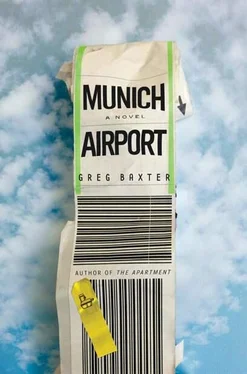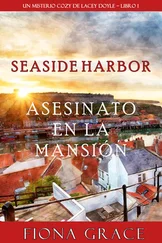Once Otis had departed, I found myself sitting awkwardly close to Ulrika and awkwardly far away from the others. Ulrika said, How Jewish are you, exactly? I said, I have to go to the bathroom. I did actually have to go. The sip of whiskey I had swallowed was causing indigestion and some nausea. I was shaking. And walking wasn’t easy, my legs felt hollow. But the stall was clean. The walls were chipped, and covered in graffiti, but underneath the disrepair I could see how clean the room was, how spotless. And it was a great relief, a relief so great it made me emotional. I closed the door behind me and sat on the commode, which was also clean and dry. Maybe I was the first person in there all day. I put my head in my hands. I didn’t think I would get past that night. I thought I would have to eat. I was starving. It didn’t seem that I would ever lose my appetite. There was a part of me prepared to eat the toilet paper in that bathroom. My sense of balance was disturbed, and the objects before my eyes were floating like debris in shallow, choppy water. I was looking at the graffiti in front of me, but my sight was swirling — it made me more nauseous to concentrate. Finally I gave in, I threw up, and then I felt a little better. I sat for a while longer. I checked my phone to see if there was any word from Trish and my father. Then I got up and washed my hands. I washed them for a long time, in cold water, because it cooled me off to run the cold water over my wrists. When I went back out, Anna and Ulrika were having a conversation in German, and Dolores seemed left out, so I sat beside Dolores, thanked her for coming, and asked her if Miriam had said anything else in December, anything at all. But before she could answer, I said, So far as I know, Miriam only came to London once, and she didn’t come to see me. She looked great. She was sort of plump. But she got really sick, and that’s why she called me. The next time I saw her was four or five years later, in Cologne, and she looked…But I couldn’t finish the sentence.
Anna and Ulrika were having a conversation that made Ulrika laugh and Anna smile, and that was how I’d hoped the night would go, though on a larger scale. I could see Dolores didn’t, or wouldn’t, trust me with a single one of Miriam’s secrets — assuming she knew any — because I did not comprehend the problem. I said, In Cologne, she told me that denying her appetite empowered her, but it was in London, when she was sick, that she’d had the opportunity to understand, perhaps, the power of that denial. Dolores listened, but she would not agree or disagree. I said, I haven’t eaten in five days, well, except for some bread. I think I expected her to be a little proud of me, or maybe I wanted her to know that I did, in fact, understand denying hunger — though of course I did not — but she just smiled and looked a little sad, as though nothing could be done, as though no amount of sympathy or concern or analysis could make the world appetizing.
In Cologne, on the night that Miriam came to visit, we went to a few bars before we decided on a place to eat. It was officially still a few days away from Mardi Gras, but the streets were mayhem. Many were blocked, and those that weren’t — at least around our hotel — were being crossed by pedestrians. I saw a lot of people from the conference. They were the soberly dressed ones, with ID badges around their necks. Everyone else was in costume, or at least something sparkly, or a little bit festive. There were several outdoor stages, some were playing folk music, others were playing outdated rock. It was also weirdly nonaggressive. Instead of people arguing or scuffling, they started dancing, or hugging, or singing. It was snowing. I guess people love the snow. We considered a dozen bars, but we couldn’t fit inside any of them. Then we found one that was only mildly overcrowded. The place — I assume everywhere was the same that night — served six beers at a time, little Kölsch beers on a slotted tray. I drank them quickly. Miriam didn’t have anything. People kept shouting in our ears. They shouted Prost! or Sláinte! They wore clown wigs or cowboy hats, and glow-in-the-dark spectacles, or spectacles with hypnotic swirls on them. It wasn’t my scene, and it didn’t suit Miriam, either, though she always shouted Prost! or Sláinte! back to them. I just decided to get drunk. Miriam smoked a lot. She had smoked at least a dozen cigarettes by the time we got to the bar, and bought two more packs in a tabak on the way. I tried not to be judgmental, but I must have given her several judging looks, because she snapped and said, Just because you quit doesn’t mean I have to. I said, I’m sorry, I know, I don’t really care, it’s just that it doesn’t make sense. Cigarettes cost money and they kill you. Some assholes get rich for making poison, then you get sick, and then some even bigger assholes get overpaid for giving you drugs and operations while you die.
She put her hands on her ears until she could see I’d stopped talking, and I decided not to continue giving her a hard time. I was so happy to see her, and I told her I was happy to see her, and she should smoke as many cigarettes as she liked. We ate dinner in a little Lebanese place down a gray, soggy backstreet. Most of the people there looked like regulars. It wasn’t full of shouting. I ordered a big platter of food. Miriam got a glass of wine. To make the evening more comfortable, she ate some bread and hummus. The night finally picked up. This is great food, I said. It’s wonderful, she said. After that we went to a cocktail bar, then we drunkenly wound around the streets, taking it in, before returning to the hotel. The next day, she would travel back to Berlin, and I would fly back to London. The conference had been a waste of time, but the trip had been worth it. We had to stop before crossing a street because a yellow streetcar went by, and I put my arms around her, kissed her hat, and thanked her for coming out. I hadn’t realized how badly I needed to see you, I said.
Dolores didn’t stay too much longer. When she left, Ulrika said, That, too, I find very disconcerting in this country, too much starvation has happened here, I think it makes a wrong statement. Anna went to the bathroom and Ulrika said, I have to go, but perhaps you’d like to come over and have dinner with me and my husband. I said, I have a feeling they’re releasing Miriam’s body tomorrow, and once that happens, we’ll be very busy. She said, My husband is completely open-minded, he’s also an artist. I had a feeling he might be, I said. I could call him now, she said. We’re only distantly Jewish, very distantly, we’re anti-Semitic Jews, I said. She said, Well, that’s sometimes as good as you can get around here. I said, No thanks, really. She said, It’s a pity, anyway, sorry about Miriam, have a nice journey back to the States. Thank you, I said. She stood, and Anna arrived back. Good-bye, everyone, said Ulrika. Good-bye, I said. Good-bye, said Anna. Anna plopped down in her seat. I’m quite tipsy! she exclaimed. Then she looked at me, frowned, and said, Oh, you’re not tipsy at all. She decided to move closer, or I asked her to move closer, because she was far away and she was the only one left. We stuck around for an hour longer. I spoke some German with her, just to get an objective assessment of my language skills. Even though I had done nothing at all to improve my German, except to speak it badly, I felt I was on the verge of fluency. I don’t think that’s German, she said. In the Rhineland, I said, everyone understood me perfectly. Then I told her all the stories from my trip from Walluf to Koblenz. And then we talked a little bit about Miriam.
Anna lived not far from our apartment, so we decided to accompany each other on the underground. It turned out to be my last time on the underground. I thought it might be. The very next morning, Miriam’s body was released, and from that point forward, Trish took care of almost everything, but we had to travel around a lot with her. One of the embassy drivers escorted us — we spent the last two days in Berlin in a black bulletproof Audi. The underground wasn’t busy, and Anna and I got seats beside each other. She was smart, witty, and optimistic. Her accident had left her in a coma for almost six months, then she couldn’t do much for a year after that. Seven years had passed, and only now was she starting to get her energy back. But I am forty-two, she said, so it’s not like there’s a lot of energy available. I asked her what had happened. She said, I don’t really remember. I saw it on CCTV in the courtroom. I was riding my bike and a truck came from my side and hit me. He was traveling very fast. The court decided it was my fault.
Читать дальше











